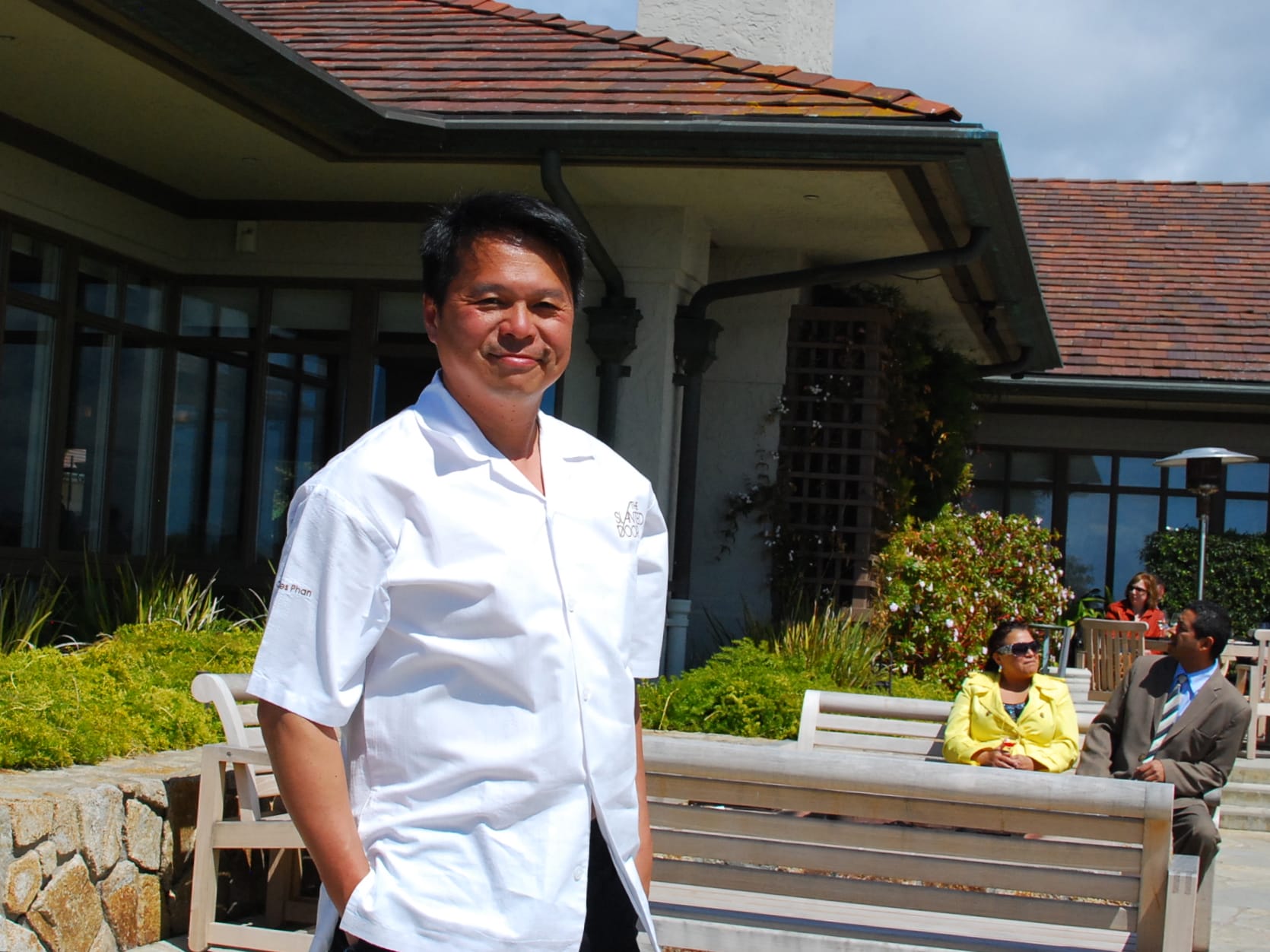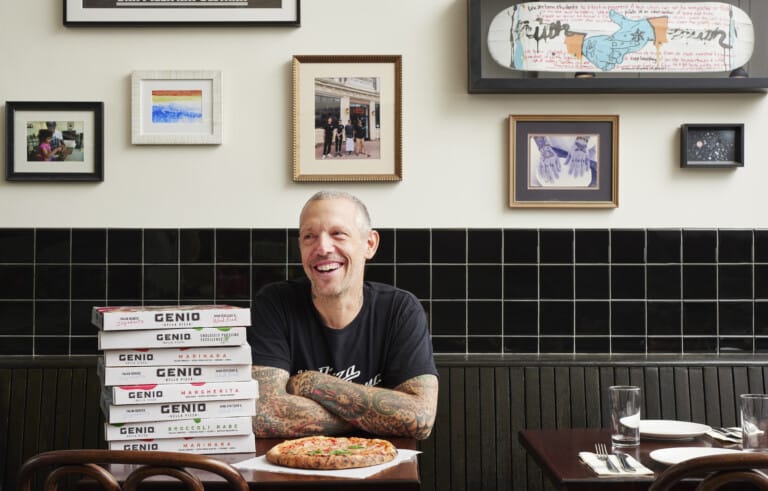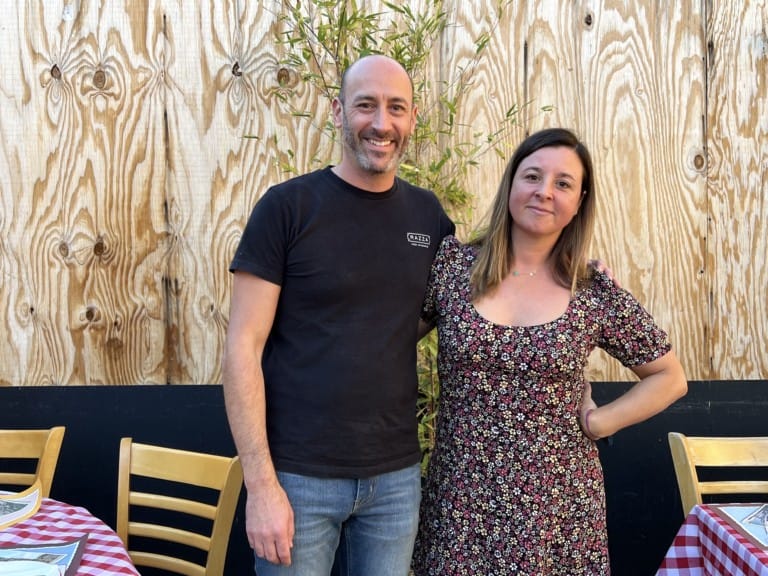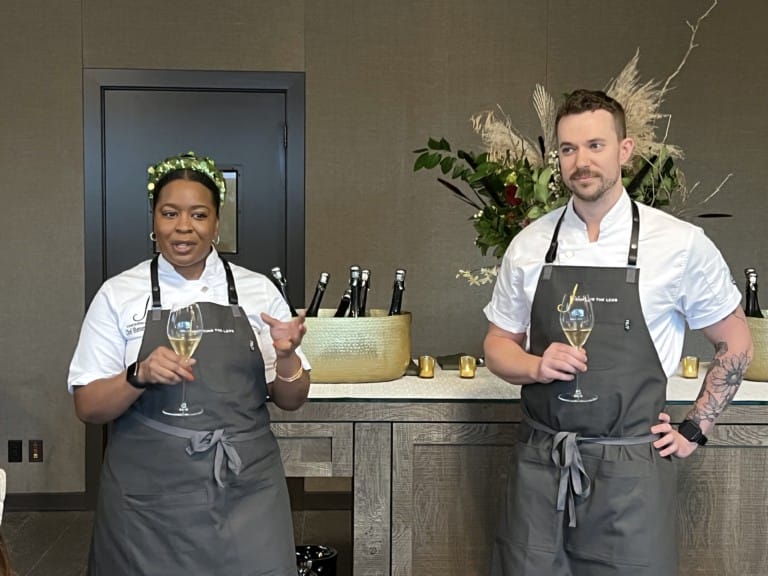INTERVIEW CONTINUED FROM PREVIOUS PAGE
Josh Lurie: Do you see signature dishes as a positive?
Charles Phan: Yeah, it’s like a greatest hit. Once you do it, people come back for it. The only challenge is to make sure you don’t get bored. Personally, you don’t want to eat it, because you’re sick of seeing it, but every now and then, you taste. We have shaking beef on the menu for 16 years. Every couple years, we change the cut of meat. Say, grass-fed beef, or we find new watercress. Some dishes, we like to retire, just to get away for a little while, but that’s just the restaurant business. People could be from England, they wait a year and come back, they want the same dish. And the local guy that’s been here three times a month, they want some new dishes, so you always have to have both. Like Chez Panisse, they will get you hooked on the ingredients, so you’re not thinking about a particular dish. And you might just go there and you sort of stop expectations, but most restaurants, like Zuni chicken, you think about it if you haven’t been in a long time. It’s very elusive about how those things come about. It’s not just something you can go and create, a signature dish. It’s like the greatest hits, with a song, it’s all about when you do it, and the time, and the customer, and the mindset. Those dishes come out. Yeah, the first three or four years, I was on fire. All the signature dishes were created in the first three or four years, and it’s because those are the classic dishes of Vietnam. Those are the greatest hits, just rebroadcast with local ingredients, and it got real big. Now we try to find different, new dishes, and constantly put it out there to see if people like it. It’s harder now because you lose half the customers. They come in and they’re buying the same old, same old. New dishes have a chance to really take off. That’s why new dishes are created in the first couple of years, because it’s a brand new customer that comes to your restaurant. Those become your signature dishes. It’s hard to create signature dishes. I just don’t see it very often. Usually signature dishes, just from my memory, are always done pretty early on in the restaurant career.
JL: What was your very first night like in a professional restaurant kitchen, and where was it?
CP: Well, I took a year to build my restaurant and didn’t really think about food. I had no place to cook. Finally, the restaurant was built and I gave myself two weeks to get the menu ready, and I had a sign in the window, and it had only seven or eight dishes, and I couldn’t even get all of them up. I had to postpone two, three weeks after that to reopen. We just weren’t ready.
JL: So you never cooked in a professional restaurant kitchen before The Slanted Door?
CP: No.
JL: That’s amazing.
CP: I don’t recommend it. I was going to the store, buying green beans, enough green beans for two days. I had no idea that you can prep the day before. I just thought everything had to be fresh, so I had to prep that day and cook that day. I used to be the first guy in and last guy out. I would clean the kitchen, and I would wake up in the morning and try to make it out to the produce market. I’d get down there, I’d be the last guy, and all my food was just sitting on the dock. And everybody else is closed, and the guy I’m buying from is just trying to wake me up and try to find me on a Friday afternoon. They go home at 10 o’clock. I’d been there until 4 in the morning.
I’ve been a refugee. I’ve been in a lot of places that are foreign to me. I kind of thrive on chaos. It’s like Bubba Watson. He doesn’t mind that he’s in the bushes and can get out of it. He doesn’t worry about trouble. That’s why he wails the ball, and they call him Bubba Golf. Same way with me. My mom, my dad, he was in China, went to Vietnam, ended up working in a beef jerky factory. You do anything to survive. Just be on your toes.
When I was in the restaurant business, I remember, if you talk about nervousness, it was really my first day bussing tables. I’d never even been inside a white man restaurant in my life, and I go there and I work as a busser. That was my first job, going there, and I’m so nervous, and until this day, I can still remember that energy, that nervous energy. But you’ve got to smile and pretend you know what you’re doing, and use your brain. You use your brain. You look. You’ve got to use your brain and solve problems that you could solve. And sometimes it comes back to haunt you. I remember in 1982, a restaurant opened called Café Royale. This crazy chef, he’s screaming, yelling, just like any other chef, really mean, and I was just trying to figure out things I could do to make things better. He had all these baguettes. At that time it was called Baker of Paris, that was like a little Creole place, and I remember the bread was so long it wouldn’t fit in the oven, so I cut the ends off and stick it in the oven to give it heat, really simple. So I did that, and he just yelled at me and made me feel so bad in front of everybody. He called me an idiot, “Why would somebody cut the bread and dry the bread?” But at the same time, deep in my heart, I knew there was no other oven. It’s not like we had a gigantic bread oven, and at some point – I guess you could not bake it – but at some point you’ve got to cut it. That’s just how it is. I always tell my staff, “I’d rather correct you if you try something, you do something, instead of just sitting there and not doing anything.” Not doing anything, you’re not learning from it, you’re not making decisions, you don’t think through the whole process, what needs to be done. Like these catering jobs, we come in and bring four bags of product, they don’t think. The guy that doesn’t think, they dump the whole bag into something without asking. Now they’ve ruined it and I’m 50, 60 miles away from the nearest Chinese store. You know, they get yelled at, but that’s okay, you get yelled at, and next time, you’re going to ask questions before you touch anything. But a lot of people make assumptions. You give them some green onion and they start cutting it, but you don’t know who the chef is. They want it a certain way, but you can’t just make all these assumptions. Then again, there are people who don’t think and do things blindly and get yelled at. And there are people who don’t do anything and just stand there the whole time. They get yelled at too, but in time, you will pick up all these experiences and get through it. I always call it the refugee mentality. I think it’s a great mentality to have, because when you’re a refugee, you’ve got nobody to rely on. All you have is you and yourself. You’ve just got to figure out because often people just sit there praying the Messiah is going to come. Or they just sit there. If you’re a refugee, you know the Messiah is not coming anytime soon, so start using your head to make things happen.









Blog Comments
Sharon
August 1, 2013 at 10:58 PM
Ηi! I’ve been reading your blog for some time now and finally got the courage to go ahead and give you a shout out from Lubbock Tx! Just wanted to mention keep up the fantastic work!